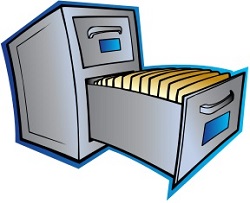- Home
- Better Memory
- Why We Forget
Do You Know Why We Forget?
Have you ever wondered why we forget so much, when scientists say everything we experience is stored deep in our minds? If the information really is in our brains, why can't we remember it?
Experts say a main reason is that we lose the mental handle. Think of a time you couldn't remember something, but it came back to you later when you weren't thinking about it.
The information was in your brain all along - you just couldn't find it!
This is known as "cue-dependent forgetting". The reason you forgot the information was that you couldn't find the right cue to retrieve it from your memory banks.
Imagine that you wrote down all the facts you've ever known on index cards and threw the cards randomly into a box. If you wanted to find a particular card, you wouldn't know where to look because it's a jumble. So it can be with your memory.
As Dr. Kenneth Higbee, a well-known memory expert, says:
It is the disorganization in your mind, not the amount of material, that hinders memory.... Long-term memory is relatively permanent, and has a virtually unlimited capacity.
Now imagine that the index cards were filed alphabetically in neat folders. Finding a certain card would be much easier, wouldn't it? This is the difference between an unorganized mind and an organized mind.
How to Prevent Forgetting
If you could create mental handles, or cues, for the information, this would provide the organization your brain needs.
Now that we know why we forget, how do we prevent it? In other words, as you learn new things, is there a way to create these mental handles? The answer is yes.

The same memory skills that professional memory performers use are available to anyone. Somehow, though the secret is out, most people seem not to have heard about it. In fact, the best students use these skills all the time - sometimes even without realizing it.
If you are serious about improving your memory, learn the memory skills, also known as memory systems. When I started practicing these, everyone around me was amazed. Now no one believes me anymore when I tell them I actually have a bad memory. (You might also want to check out my quick guide on how memory works.)
Foreign languages, long lists, facts, figures, stories, numbers, speeches, you name it. When you use powerful memory techniques like the Keyword method, Link method, and Peg method, learning becomes a lot more fun because you remember more in much less time. And you retain it better.
So, one secret to a better memory is this: create a mental handle ("cue") for everything you want to remember. Then you can find the information in your brain when you need it.
There are, of course, other causes of why we forget things besides cue-dependent forgetting.
For example, we might not have learned the information well in the first place. Interference with the many other things we have learned can also cause problems with memory.
But one thing you can control is establishing the mental hooks to material as you learn it.
If you use the memory systems and other related techniques to intentionally create cues when learning something new, you will find it much easier to remember the information later.
Published: 11/13/2007
Last Updated: 06/11/2020

Newest / Popular
Multiplayer
Board Games
Card & Tile
Concentration
Math / Memory
Puzzles A-M
Puzzles N-Z
Time Mgmt
Word Games
- Retro Flash -
Also:
Bubble Pop
• Solitaire
• Tetris
Checkers
• Mahjong Tiles
•Typing
No sign-up or log-in needed. Just go to a game page and start playing! ![]()
Free Printable Puzzles:
Sudoku • Crosswords • Word Search







